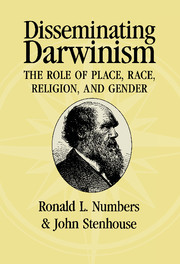Book contents
- Frontmatter
- Contents
- List of contributors
- Acknowledgments
- Introduction
- 1 Science, region, and religion: the reception of Darwinism in Princeton, Belfast, and Edinburgh
- 2 Darwin down under: science, religion, and evolution in Australia
- 3 Darwinism in New Zealand, 1859–1900
- 4 Environment, culture, and the reception of Darwin in Canada, 1859–1909
- 5 Darwinism in the American South
- 6 Darwinism, American Protestant thinkers, and the puzzle of motivation
- 7 Exposing Darwin's “hidden agenda”: Roman Catholic responses to evolution, 1875–1925
- 8 American Jewish responses to Darwin and evolutionary theory, 1860–1890
- 9 Black responses to Darwinism, 1859–1915
- 10 “The irrepressible woman question”: women's responses to evolutionary ideology
- Index
1 - Science, region, and religion: the reception of Darwinism in Princeton, Belfast, and Edinburgh
Published online by Cambridge University Press: 06 July 2010
- Frontmatter
- Contents
- List of contributors
- Acknowledgments
- Introduction
- 1 Science, region, and religion: the reception of Darwinism in Princeton, Belfast, and Edinburgh
- 2 Darwin down under: science, religion, and evolution in Australia
- 3 Darwinism in New Zealand, 1859–1900
- 4 Environment, culture, and the reception of Darwin in Canada, 1859–1909
- 5 Darwinism in the American South
- 6 Darwinism, American Protestant thinkers, and the puzzle of motivation
- 7 Exposing Darwin's “hidden agenda”: Roman Catholic responses to evolution, 1875–1925
- 8 American Jewish responses to Darwin and evolutionary theory, 1860–1890
- 9 Black responses to Darwinism, 1859–1915
- 10 “The irrepressible woman question”: women's responses to evolutionary ideology
- Index
Summary
In recent years there has been a remarkable “spatial turn” among students of society and culture. The genealogy of this twist of events is both multifaceted and complex. Among philosophers, social theorists, and historians of science there has been a renewed emphasis on the significance of the local, the specific, the situated. Some philosophers thus argue that what passes as a good reason for believing a claim is different from time to time, and from place to place. Rationality, it turns out, is in large measure situation specific, such that what counts as rational is contingent on the context within which people are located. Good grounds for holding a certain belief are evidently different for a twelfth-century milkmaid, a Renaissance alchemist, and a twentieth-century astrophysicist. Among social theorists there has also been a recovery of spatiality. The importance of the diverse locales within which social life is played out has assumed considerable significance with such writers as Clifford Geertz, Erving Goffman, and Anthony Giddens. In Geertz's telling, for example, law turns out not to be ecumenical but local knowledge – local in terms of place, time, class, issue, and what he terms “accent.” For Goffman, the situations facilitating human assemblages – gatherings, social occasions, informal encounters, and so on – furnish agents with those repertoires of structural meaning that they draw upon to constitute communication. In Giddens's case it is because of the routinization of everyday life that he sees human agents as transacting their affairs in a variety of locales – settings of interaction which are themselves frequently zoned to facilitate routine social practices.
- Type
- Chapter
- Information
- Disseminating DarwinismThe Role of Place, Race, Religion, and Gender, pp. 7 - 38Publisher: Cambridge University PressPrint publication year: 1999
- 8
- Cited by

